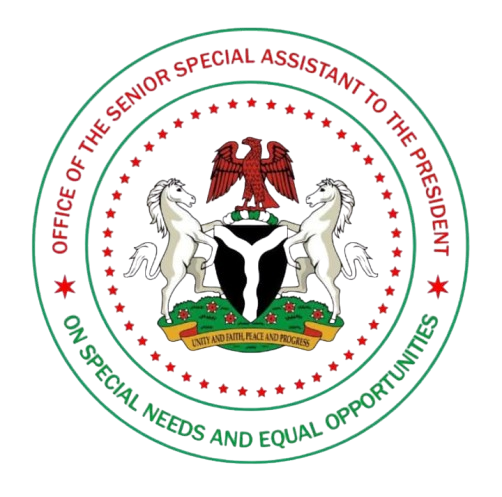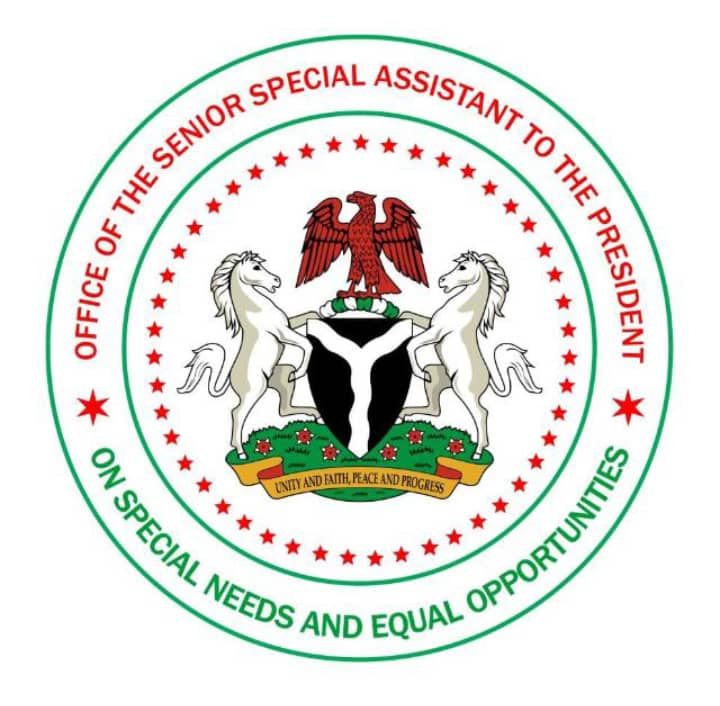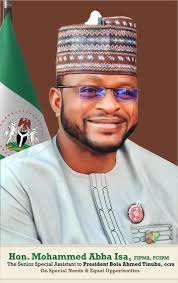By Lanre Oloyede
Abuja – The Senior Special Assistant to the President on Special Needs and Equal Opportunities, Hon. Mohammed Abba Isa, has outlined five key recommendations to ensure accessibility compliance in public buildings.
Hon Abba Isa, who was represented by his Director Media and Communications, Lanre Oloyede, presented these measures at a Stakeholders’ Meeting with the Permanent Secretary, Special Duties Office, Office of the Head of Civil Service of the Federation. The meeting focused on the audit of government buildings in line with the Discrimination Against Persons with Disabilities (Prohibition) Act, 2018.
The session, convened at the directive of the Head of Civil Service of the Federation, was presided over by the Permanent Secretary for Special Duties, represented by Arc. Joy O. Baderin, Director of the Infrastructure Management Department.
The meeting also had in attendance representatives from the Office of the SSA on Special Needs and Equal Opportunities, officials from the Office of the Head of Civil Service, and a delegation from the Nigerian Institute of Architects (NIA), led by its Honorary General Secretary, Arc. Chike Chamberlain Ibeanu.

Government’s Commitment to Enforcing Accessibility Compliance
Hon. Abba Isa emphasized that President Bola Ahmed Tinubu had, in November 2023, approved the establishment of the Inter-Ministerial/Agencies Committee on the Implementation of the National Disability Act. This committee is tasked with ensuring the full enforcement of the Act across all Ministries, Departments, and Agencies (MDAs), making accessibility a mandatory legal requirement rather than a voluntary initiative.
One of the committee’s core responsibilities includes conducting comprehensive accessibility audits to assess government buildings and recommend necessary modifications such as ramps, railings, Braille signage, elevators, accessible restrooms, and audio guides.
To further enforce compliance, Hon. Abba Isa revealed plans to establish a Presidential Task Force on Accessibility, in collaboration with the National Commission for Persons with Disabilities (NCPWD). The task force will be responsible for:
Monitoring government institutions to ensure accessibility modifications are made.
Enforcing sanctions on organizations that fail to comply with accessibility standards.
Providing compliance guidance and technical support to institutions facing challenges.
“It is no longer enough to encourage compliance; we must now demand and enforce it. The lives and dignity of over 35 million Nigerians with disabilities depend on our collective action,” Hon. Abba Isa stated.
Challenges Hindering Full Implementation of the Disability Act
The SSA outlined key challenges obstructing the full implementation of the National Disability Act:
1. Lack of Awareness and Political Will – Many institutions remain unaware of their obligations under the law, and accessibility issues are often not prioritized.
2. Limited Funding for Accessibility Modifications – Retrofitting existing buildings and ensuring digital accessibility require financial commitments that are often overlooked.
3. Weak Enforcement Mechanisms – Despite the legal provisions, penalties for non-compliance remain minimal, leading to a lack of urgency in implementing necessary changes.
4. Insufficient Representation of Persons with Disabilities (PWDs) in Decision-Making – The absence of PWDs in key decision-making roles results in ineffective accessibility policies.

Key Recommendations for Accessibility Compliance
To address these challenges, Hon. Abba Isa proposed the following five key recommendations:
1. Stronger Enforcement and Accountability Measures
Government agencies should be held accountable with clear deadlines for accessibility modifications.
The Presidential Task Force must enforce penalties for non-compliance while supporting institutions in making necessary adjustments.
2. Inclusion of Accessibility in Government Budgets
MDAs should allocate a percentage of their annual budgets to accessibility projects.
A special intervention fund should be created to support accessibility modifications in public institutions.
3. Mainstreaming Disability-Inclusive Policies
Every government institution should have a Disability Inclusion Desk to oversee policy implementation.
Training on disability etiquette and inclusive service delivery should be made mandatory for civil servants.
4. Expanding Collaboration with the Private Sector and Development Partners
Accessibility should be a shared responsibility involving government, private organizations, and development agencies.
Public-Private Partnerships (PPPs) should be encouraged to fund and execute accessibility projects.
5. Strengthening the Role of Organizations of Persons with Disabilities (OPDs)
OPDs should be officially integrated into government monitoring teams to provide firsthand assessments.
Regular town hall meetings should be held for PWDs to report non-compliance issues.
Architects Push for Immediate Accessibility Audit
Speaking at the meeting, Arc. Chike Chamberlain Ibeanu of the Nigerian Institute of Architects (NIA) emphasized the need for inclusive architecture, stating:
“Good architecture is not truly good unless it is inclusive. Public buildings should not foster segregation or discrimination. Unfortunately, since the expiration of the moratorium period, compliance with accessibility standards has been slow. That is why we have engaged the Office of the Head of Service to carry out an accessibility audit of MDAs to set an example for others.”
Arc. Ibeanu noted that NIA has chapters across all 36 states and the FCT and is fully equipped to conduct a nationwide accessibility audit. The organization also plans to issue certificates of compliance to MDAs that meet the required standards.
Government Endorses Nationwide Accessibility Audit
In her remarks, Arc. Joy O. Baderin pledged the full support of the Office of the Head of Civil Service for the accessibility audit exercise. She suggested that the audit be conducted in phases across the six geo-political zones, beginning with federal government secretariats in each state.
> “Once the assessment is completed, the Office of the Head of Service will issue a circular directing all MDAs to comply with the findings of the audit,” she assured.
With these commitments, stakeholders expressed optimism that the enforcement of accessibility standards in public buildings would become a reality, ensuring that government institutions lead by example in upholding the rights of over 35 million Nigerians with disabilities.
Conclusion
The Stakeholders’ Meeting marks a significant step toward making public buildings in Nigeria accessible to all citizens, regardless of ability. If implemented, the five key recommendations by Hon. Abba Isa could transform the landscape of public infrastructure, ensuring that inclusivity becomes a standard rather than an afterthought.


